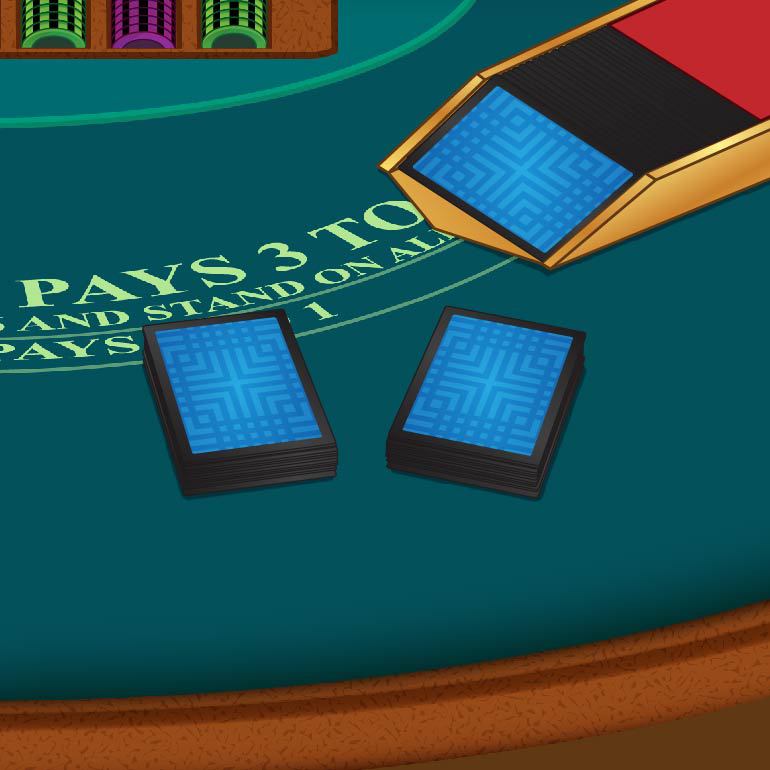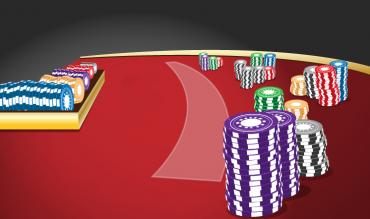Introduction
Free Bet Blackjack is a variation of the traditional game of blackjack. The “twist” in this game is this: the casino will pay the player to split and double down in certain hands.
Table of Contents
1.0 Basic Playing Rules
The game is offered in many land-based and online casinos. Most casinos use six decks although it is available in single-, double-, and eight-deck games. Rules can vary (more shortly) but the most popular version is a six-deck game with these rules:
- Dealer hits soft 17
- Blackjacks pays 3 to 2
- Doubling down allowed on any first two cards
- Doubling down allowed after pair splitting
- Respltting allowed, including aces, up to four hands
2.0 So What Is Free?
What separates Free Bet Blackjack from a traditional blackjack game is this:
- Free Double Downs, and
- Free Splits
3.0 Free Doubles
When you are dealt a hard 9, 10, or 11 and you want to double down, you indicate this to the dealer. Instead of your making the additional wager for the double down, the dealer will place a plastic, free bet lamer as your secondary wager. (Essentially, the casino makes the bet for you.) If you win the hand, your original wager will win even money and she will take the lammer and replace it with a real casino chip that is equal in value to the original wager.
Here’s an example of how this works.
Suppose you wager $10 and are dealt a hard 11. You want to double down so you indicate this to the dealer. She will place a lammer next to your original $10 wager.
- If you win the hand, the original $10 gets paid $10, and after the dealer removes the lammer, you’ll be paid another $10. Essentially, you risked $10 on the hand with the opportunity of winning $20.
- In the event the hand loses, you lose only the original $10.
- If the hand pushes, or ties, you will receive your original $10 wager and the dealer will take back the lammer.
Free doubles are not in effect for any hand that contains an ace (i.e., any soft hand). You can still double down on a soft hand, but you do not get the free double.
4.0 Free Splits
In addition to the Free Doubles, there are also Free Splits where the casino will pay for the secondary bet on splits, meaning the dealer will place a Free Bet lammer on the second hand of a split.
Here’s an example.
Suppose you wager $10 and are dealt a pair of 8s. You indicate to the dealer that you want to split. She will separate your pair of 8s into two hands, each starting with a count of 8. Your original $10 wager stays with your first split hand, and the dealer will place the free bet lammer on the second hand. You must play each hand one at a time.
Several scenarios could occur.
- If either of the two split hands receives a card of the same rank, you have the option to split again, and the dealer will place a free bet lammer on the third hand. (You can split up to a total of four hands, including aces. Three of them will have a free bet lammer and only one hand will be at risk with “real” money.)
- You can also double down after splitting. Each double can also have a free bet lamer.
- With pair splitting up to four hands and doubling, it’s possible to have eight hands, seven with free bets, and only one at risk.
- For winning hands, each free bet lammer is replaced with a real casino chip equal to the original wager.
- On hands resulting in a push or loss, the dealer will take back the free bet lammer.
Free Splits are available on all pairs except ten-value cards. In addition, if your split results in a soft hand and you want to double, you can’t ask for a free double (but you can double down with real casino chips).

5.0 The Effect of Free Double and Splits
If just free doubles and free splits were allowed in a traditional six-deck blackjack game, according to Geoff Hall, the inventor of Free Bet Blackjack, the player would have about a 6% advantage. Since the casinos could not offer a game with this much advantage to the player, there is an important “catch” to Free Bet Blackjack (see next section).
A secondary characteristic of this game is its volatility is less than a traditional game (because of the free bets and splits where only half of your money is at risk); therefore, your bankroll will last longer. (See also Section 9.0.)
6.0 The Catch
To compensate for the Free Doubles and Splits, there is a “Push 22” rule, which is this:
- A dealer’s “bust” hand of 22 will push (or tie) all unbusted player’s hands rather than paying them. (Except an untied player’s blackjack, which is paid at 3 to 2.)
Bottom Line: No matter how good your hand happens to be (even if it’s a 21), if the dealer busts with a total of exactly 22, the hand is a push.
(Note: Geoff Hall also invented the blackjack variant called Blackjack Switch, which also has the “Push 22” rule.)
7.0 Playing Strategy
The most important playing strategy for Free Bet Blackjack is this:
- Always accept all free splits and doubles even if it seems counterintuitive (like doubling 9 against a dealer’s ace).
You must know the basic playing strategy for this game since a dealer bust of 22 reverting to a push reduces how often you will double down on soft hands and you’ll be more aggressive in your hitting, doubling, and pair splitting strategy than you normally would be in a traditional game. Moreover, when you play this game, some of the time you will use be using the traditional basic playing strategy (for example, doubling on soft hands), while on other hands with free bets and splits you will be using the Free Bet playing strategy.
There is a published basic playing strategy for Free Bet Blackjack. If you want to play this game, I strongly encourage you to study and use this strategy. You will find it on wizardofodds.com.

8.0 House Edge
The house edge is dependent on the playing rules. For the standard six-deck game with the rules above, the house edge against a basic strategy player is 1.04%. If late surrender is allowed, the house edge decreases by 0.21% to 0.83%. If the dealer must also stand on soft 17, the house edge decreases by another 0.31% to 0.52%.
(Note: Unlike a traditional game of blackjack, the house edge increases when fewer than six decks are used. Thus, given a choice of playing a Free Bet Blackjack game with a single deck of cards vs. six decks, the latter is the better choice. You will find the effect of different playing rules on the house edge on www.wizardofodds.com.)
9.0 Card Counting
With a mix of favorable playing rules, you can get an edge by card counting. (Assuming the cards are not reshuffled after every round, and the player is using the basic playing strategy for this game.) Blackjack Hall of Famer Don Schlesinger, author of Blackjack Attack: Playing the Pros’ Way, brought up this important point. “If the variance is less for this game, it means for the same bankroll, the card counter can bet more at all levels, since the calculation of optimal wager involves dividing by the variance. If the variance is lower, the fraction is higher. This would make the game worth playing, for sure."
10.0 Summary
- Free bets on doubling hard 9, 10, and 11, where the casino makes the secondary bet for the player.
- Free bets on splits (except on 10s and picture cards), where the casino makes the secondary split bet for the player.
- To compensate for the above, when a dealer gets exactly a 22, it pushes all player hands (except a player’s blackjack).
- The basic playing strategy is different for hands with free doubles or splits vs. hands that have money at risk.
- By playing a six-deck game with the best playing rules, it’s possible to reduce the house edge to as low as 0.52%, about the same house edge as many traditional six-deck games.
- With a mix of favorable playing rules, it’s possible to gain an edge by card counting.
